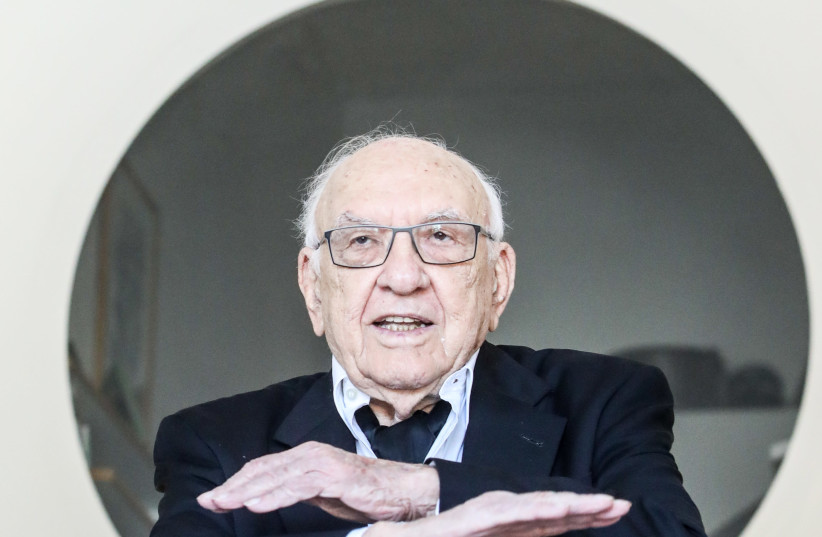Avraham Avi-hai was a mensch, larger than life, the kind they don’t make anymore. To say so is not in any way an exaggeration; his list of accomplishments on its own would take up several pages.
Over the past year and a half, I had the pleasure and the privilege of helping him compile and edit his memoirs and so I got to know this forward-looking nonagenarian, full of wit, passion and (sometimes caustic) spirit, who passed away on December 3, just a few weeks short of his 93rd birthday.
Born Avrohom Zelig (Syd) Appelbaum in Toronto in 1931 into an observant family in a Yiddish-speaking neighborhood of immigrant Polish Jews that he described colorfully as an inside-out world, his life and career would become intertwined with the history of the State of Israel.
Avraham came to Israel at just 21, together with his first wife, Hannah, whom he married at the age of 19, straight to Kibbutz Kfar Darom in southern Israel. Bored by the sight of the same people, the same food, the lack of privacy, and the repetitive work, he soon realized that kibbutz life was not for him.
Breaking into the news and beyond
He had always loved words and languages and dreamed of becoming a writer. Despite not having any experience, he wrote a letter to the founding editor of The Jerusalem Post, Gershon Agron, declaring that “A good newspaper can always use a good newspaperman.” He landed the job. It was typical of his daring attitude.

Words flowed off his tongue with old-world charm flavored with Yiddishisms, and he could recall events and even conversations from decades ago without missing a beat.
Avraham’s work at the Post and later at Israel Bonds brought him into contact with Israel’s elite, and he soon found himself working with Teddy Kollek, then the director-general of the Prime Minister’s Office and later legendary mayor of Jerusalem.
It was there that he changed his name from Syd Appelbaum to Avraham Avi-hai, as the policy under Israel’s first prime minister David Ben-Gurion was for government employees to shed their Diaspora names and adopt Hebrew ones.
His next stop was speech writer for then-finance minister Levi Eshkol, with whom he continued working as secretary for public affairs when Eshkol became prime minister.
Avraham took a break from government to study. He felt that he understood matters in the political and foreign affairs arena instinctively but didn’t really understand them intellectually. He earned a PhD in political science at Columbia University. The best thing about having a PhD, he quipped, was being able to make people address you as “doctor” if they annoyed you.
He would go on to record many achievements, of which I will list just a few: He was world chairman of Keren Hayesod-United Israel Appeal, a job that brought him into contact with the rich and famous of the Jewish world; helped lay the groundwork for Israel’s future hi-tech economy by organizing the Prime Minister’s Jerusalem Economic Conferences of 1968–1971; was a founding dean of the Hebrew University’s Rothberg International School for Overseas Students; and a visiting professor at the University of Rochester in the US and at York University in Toronto.
Avraham’s intellectual curiosity and fields of interest were boundless; he taught himself medieval Florentine Italian to be able to read Dante in the original, along with the libretti of his favorite operas.
Avraham was proud of Israel’s progress, quoting Teddy Kollek telling him that “of all the isms of the [20th] century – Communism, Fascism, Socialism – only Zionism has succeeded.” Nevertheless, he was troubled by the current state of the country, feeling it had become hijacked by extremists and opportunists.
While he was steeped in the Bible, Talmud, and Hebrew literature, he believed in humanistic values and was deeply opposed to the rigid, nationalistic messianism of the far-Right.
Despite these reservations, Avraham was what he called a realist-optimist and believed that Israel would overcome. He wanted to bring the voice of Diaspora Jewry to the table, and his attitude toward religion was one of pluralism, with a place for all streams of Judaism.
In addition to his memoirs, Avraham authored three books: Ben-Gurion, State-Builder: Principles and Pragmatism (John Wiley, 1974); Danger! Three Jewish Peoples (Herzl Press, 1998); and a novel A Tale of Two Avrahams (Gefen, 2018). For the past few years, he also wrote a regular column for The Jerusalem Report.
As we worked on the memoir, despite his advanced age he proposed working on a compilation of Yiddish poetry that he would translate into English. Midway through our work, he presented me with a copy of a children’s book that he had written in Hebrew for his tribe of grandchildren and great-grandchildren. His generosity knew no bounds.
He is survived by his second wife, Henrietta; three daughters; two stepsons; 12 grandchildren; and 24 great-grandchildren, with two more on the way.
With exaggerated modesty, he would say of his life that “It all just happened.” That, in fact, was one of the proposed titles for the memoir; the other was “From Toronto to Jerusalem.” But, of course, nothing “just happens.” Avraham Avi-hai possessed passion and drive, knew how to charm and be kind, to create opportunity, and to seize the day.
Zay shtolts, Avraham; Zay shtolts! Be proud, Avraham – you led an extraordinary life! ■
The writer is the former editor of The Jerusalem Report.
